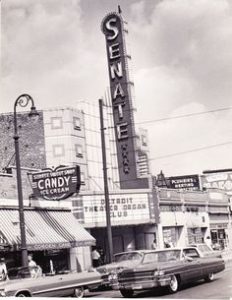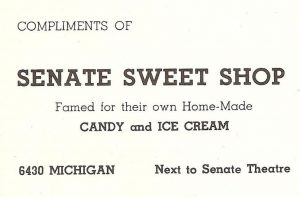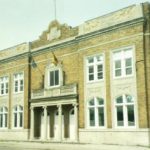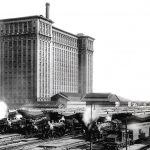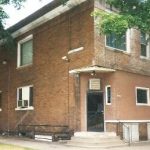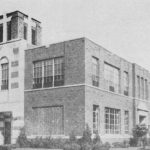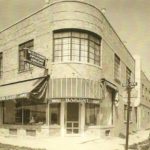A History of the Senate Sweet Shop
6430 Michigan Avenue, Detroit 48210
The Senate Sweet Shop dates back to 1918. Located along the vibrant Michigan Avenue strip between Cicotte and Gilbert Streets and conveniently situated next to the Senate Theater, the combination candy store and ice cream parlor was a lively place from its inception throughout the 1960s.
The shop was founded by Greek immigrants who came to America with a dream of owning their own business. In the early twentieth century, brothers Samuel and Gus Corden immigrated from Greece and found work with a candy maker in Chicago. After some time, the brothers pooled their earnings and made their way to Detroit, bringing with them the candy making skills they had acquired in Chicago. Setting their sights on a storefront location on the bustling west side Michigan Avenue strip, they opened their own confectionary store, fulfilling their dream of being business owners. They called their store the Senate Sweet Shop.
In ancient Greece, the Senate was the highest legislative authority. It can be assumed that the brothers named their shop after the Greek Senate. The Senate Theater, located next door at 6424 Michigan Avenue, opened in 1925, and it can also be assumed that it was named after the Senate Sweet Shop.
Samuel Corden had a son named Aristidis (known as Evans), who had pursued a career in accounting. However, he was not content working as an accountant and found that his true calling was in the family business. He gave up accounting to train in the candy making profession. Evans worked with his father and eventually began running the business.
It soon became evident that Evans made the right career choice, as in time he was considered “the true genius of the family” (https://cordenchocolates.com/the-story). It is said that Evans “could play with chocolate the way Mozart could play with music” (https://cordenchocolates.com/the-story). He developed new techniques based upon changes in the industry and the availability of new product as transportation methods became updated. Evans incorporated products from across the country into his original creations. Everything was made from scratch and with only the finest ingredients.
In the late 1960s, Evans opened a second store further west on Michigan Avenue in the city of Inkster. The store is still open as of 2021 and operates under the name Corden’s Candy Carousel.
The Senate Sweet Shop was very popular during the 1920s. Today, we may see tattoo studios that double as massage parlors or adult movie rental outlets. But the Senate Sweet Shop was founded in a more innocent time, when ice cream and candy were two products that were seen as obviously compatible, and which were highly desired by the consuming public. When a big screen movie theater was placed next door, the combination proved to be quite attractive and successful.
After attending a night out at the cinema, patrons of the Senate Theater had a simple walk of only a few feet to the Senate Sweet Shop, where they indulged in a treat of homemade ice cream or candy. There were no freezers containing cardboard boxes of frozen ice cream to go, or racks of pre-wrapped candy bars that had been shipped to the store in boxes direct off factory assembly lines. Everything was made right there on the premises.
During the Great Depression between 1929 to 1939, a movie theater ticket cost on average between five to ten cents. As an added bonus, some of the theaters, such as the Kramer Theater at 5701 Michigan Avenue, featured “dish night.” On that special night, which was held once a week, patrons received one piece of a set of dishes, the goal being to collect the entire set.
The Senate Sweet Shop had a special ambiance, and a large part of its atmosphere was its soda fountain. These unique attractions became very popular during the 1920s due to prohibition. Because the manufacture, production, transport, sale, consumption, and even storage of alcohol was illegal in the U.S. between 1920 and 1933, the soda fountain became a place where people could gather legally to socialize. Many drug stores had soda fountains where lunch was served. Employees who worked behind the stores’ soda fountains were known as soda clerks.
The term soda fountain referred not only to the machine that made a special drink called an ice cream soda, but also to the establishment itself, which featured a long, often L-shaped counter and stools where patrons sat to eat. Stools typically were pedestal stools that swiveled and were made of steel or polished chrome with padded, leather-covered seats. Some had built-in footrests and mechanisms that allowed patrons to adjust the stools’ height.
The actual soda fountain that was used to make drinks was situated behind the counter. Soda fountain owners employed soda “jerks,” who operated the soda fountain and waited on customers. The soda jerk was similar to today’s coffee house barista. Almost always the jerk was a male, and usually he was young. While today’s barista specializes in espresso-based coffee drinks, the soda jerk was responsible for making soda drinks and ice cream desserts. The name soda jerk was a spin on the title soda clerk, the name given to employees who worked behind the lunch counters at drug stores.
An ice cream soda was made from a combination of flavored syrup and carbonated water. The drink was served in a specially designed, clear, tall glass with a straw, and it was often garnished with whipped cream and a cherry. The term “jerk” was further derived from the jerking motion used to make the ice cream soda beverage. While adding soda water to the drink, the server had to employ a jerking action to swing the handle of the soda fountain back and forth.
The main attraction of the Senate Sweet Shop’s soda fountain was the banana split. A crosswise-cut banana was placed in a large, oblong, glass bowl. Three scoops of various flavors of ice cream were placed on top of the banana pieces. The delicious concoction was garnished with whipped cream, chopped nuts, and a cherry.
Sometime around 1970, Evans Corden closed the Senate Sweet Shop and moved all operations to the company’s Inkster location. Evans Corden passed away on June 16, 2014. Memories of the Senate Sweet Shop live on at Corden’s Candy Carousel in Inkster where, as of 2021, the family’s third generation chocolatier, Nick Corden, runs the establishment. All candy is still made using the family’s age-old recipes.
The Senate Sweet Shop at 6430 Michigan Avenue, founded by Greek immigrant brothers, served the Polish American community of west side Detroit for several decades. It was a place where spirits were lifted during the dark times of the Great Depression. It served as a gathering place where small celebrations took place for those whose loved ones had returned from World War II. It was a bright spot in the lives of the hardworking Polish immigrants who looked forward to a night out at the cinema and a delectable treat afterwards. It was one of the gems of our west side Polonia.
Sources:
- https://www.timetoast.com/timelines/the-history-of-the-soda-fountain
- https://en.wikipedia.org/wiki/Soda_fountain
- https://www.telegramnews.net/story/2019/05/09/business/inkster-chocolate-shop-is-a-family-business-celebrating-100-years-and-counting/632.html
- https://www.senatetheater.com/about/
- https://cordenchocolates.com/the-story
- Bartus-Sidick, Mary. “Senate Sweet Shop.” In West Side Detroit Polish American Historical Society e-Newsletter. (Volume 50: August 2015), p. 17.
Photos:
- Senate Sweet Shop and Senate Theater photo, ca. 1950s. Source: https://www.pinterest.com
- Senate Sweet Shop ad. From Chadsey High School Compass (January – June, 1947) (WSDPAHS archives)
